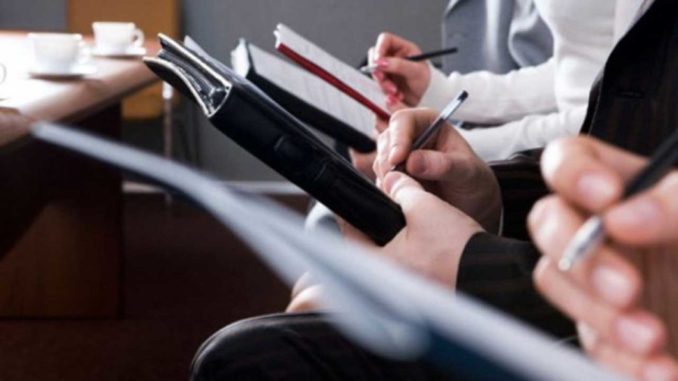
The report presented the other day by the New York-based Committee to Protect Journalists (CJP), whose research findings claimed that no fewer than 251 journalists are currently in prisons worldwide, is a sad and regrettable development. Given the growing trend of barefaced authoritarian tendencies globally, such obnoxious, unjustifiably restrictive actions must be fought against by all who cherish man’s naturally-given freedom.
Coming in the wake of the recent high profile controversial murder of Saudi journalist, Jamal Khashoggi and the continued incarceration of Al Jazeera reporter, Mahmoud Hussein, in Egypt, the CPJ report has once again brought into public consciousness the need to protect journalists and to continuously reiterate the right to freedom of information and expression in global context.
A rundown of the report, which covered a three-year research period, stated that owing to intensified repression of journalists in the last year, China, Egypt, and Saudi Arabia imprisoned more journalists as of December 1, 2018, while Turkey retained its position as the world’s worst jailer of journalists in the last three years. Turkey is said to have no fewer than 68 journalists in prison.
The CPJ’s report further stated that 70 per cent of 251 journalists were jailed on anti-state charges while 28 per cent were charged with “false news.” It also found out that politics was the most dangerous beat for journalists followed by human rights. Besides, the report claimed that an increase in the number of imprisoned female journalists brought the number to 33 globally. Of these, four were said to be imprisoned in Saudi Arabia for writing about women’s rights.
That this deliberate abuse of the rights of journalists is carried out with so much impunity in a world that claims to be opening up to differences calls for caution and prompt action. It reveals how far tyrannical regimes and powerful actors can go to cover truth and thereby dehumanize the people by denying them information that should make them free and self-governing. This is unacceptable. And so this newspaper agrees with the CPJ Executive Director Joel Simon, when he remarked: “It is unacceptable that 251 journalists are in jail around the world just for covering the news.”
Simon’s assertion, “just for covering the news,” is very instructive here in understanding the great service journalism does to man’s understanding of his environment and to the progress of human civilisation. Throughout history, journalists have served humanity by their public service mission of educating, entertaining and informing people so that the latter could make choices for their positive enhancements and those of society. And in tandem with the rapidly evolving global society journalistic practice has experienced a great transformation, occasioned by local and global socio-cultural, economic and political configurations. This has led to tension between what journalists consider as loyalty to citizens and what is passed on to citizens as the truth; and this tension often causes harrowing challenges for journalists.
Among these challenges is the difficulty in controlling the free-flow of information, especially in a world where information technology has made everyone a journalist of sorts. Other challenges include: passing on complete truth without error, the sacrifice of accuracy for speed, the fragmentation of information that leads to distortion and the attack on journalists. But the greatest of these challenges is the attack on journalists for carrying out their lawful duties. Since a true state of affairs is often times difficult to get, especially if truth hurts the other party, journalists risk their lives, sacrifice their dignity and in some cases pay the price of truth-searching with their lives.
As anyone who has associated with, or has worked as a journalist knows, genuine practice of journalism as truth-bearing and truth-telling is no mean profession. Genuine journalists are custodians of the moral values of the society: they form the ombudsman for the state-actors and negotiators for non-state actors and are the gadfly that stings the people to lawful uprising in situations of crass ineptitude and injustice.
As one commentator observed, “In a society where litanies of lies have become the gospel of governance, truth bearers would be nailed to the cross.” Thus, it is for the reason of their sacred duty that genuine journalist deserve the respect and protection demanded by their profession.
Whilst this paper condemns in strong terms attempts by state actors and repressive institutions to thwart the free flow of news and information, it also cautions against the abuse of information and the desecration of the noble profession of truth-bearing by unscrupulous characters and charlatans in the profession. Since as the old truth goes, every freedom comes with responsibility, journalists should endeavour to treat information management with some sense of responsibility, bearing in mind the overall promotion of the common good.
Rather than revel in needless grandstanding and crude posturing that put journalists and their organisations in contestation with powers that be, journalism would be better served when its professionals cultivate a high sense of moral judgment and when they uphold ethical practices matched by responsible information management that is directed at the common good.
In the main, strong men, state actors and even military officers who are often afraid of or hate the press should know that journalism practice is a constitutional responsibility as stated in Sections 22 and 39 of Nigeria’s constitution.
END

Be the first to comment